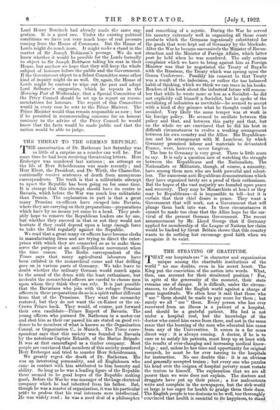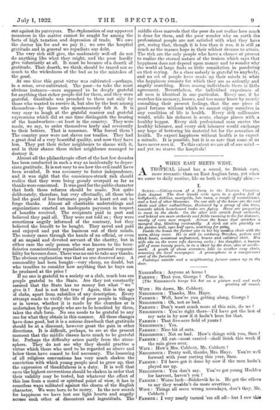THE STRAYING OF GRATITUDE. T HAT our hospitals are " in
character and organization unique among the charitable institutions of the world " no one doubts, even in his secret heart. The King put the conviction of the nation into words. What, then, can account for their straitened position ? For, in spite of the generosity of the moment, their state remains one of danger. It is difficult, under the circum- stances, to defend the English world against a charge of From( ingratitude. We often hear it said that those who use " them should be made to pay more for them ; but surely we all " use " them. Every person who has ever recovered from an illness is a patient of a hospital, and should be a grateful patient. His bed is not under a hospital roof, but the knowledge of the doctor who cured him came from there, and not in the same sense that the learning of the man who educated him came from any of the Universities. It comes in a far more direct way : it is always coming. A doctor, if he is to cure or to satisfy his patients, must keep up at least with the results of ever-changing and increasmg medical know- ledge ; and, unless he has time and opportunity for original research, he must be for ever turning to the hospitals for instruction. No one doubts this : it is an obvious and generally accepted truism ; but every one who puzzles his head over the enigma of hospital poverty must restate the truism to himself. The explanation that we are all poorer than we were does not explain. The doctors and druggists have put up their prices ; a few malcontents write and complain in the newspapers, but the sick-world at large is too eager for health to gradge them their dues. The English people is too desirdis to be well, too thoroughly convinced that health is essential to its happiness, to stand out against its purveyors. The ft-planation of our apparent meanness in the matter cannot be sought for among the facts of high taxation and depression of trade. We owe the doctor his fee and we pay it ; we owe the hospital gratitude and in general we repudiate our debt.
The very rich still give, the moderately well-off do not do anything like what they might, and the poor hardly give voluntarily at all. It must be because of a dearth of gratitude. That dearth, we think, should be traced not so much to the wickedness of the bad as to the mistakes of the good.
At one time this great virtue was cultivated—perhaps, in a sense, over-cultivated. The poor—to take the most obvious instance—were supposed to be deeply grateful for anything that richer people did for them, and they were grateful. • Gratitude was preached to them not only by those who wanted to receive it, but also by the best among themselves—by those who spontaneously felt it. It is very easy to laugh at the grateful manner and grateful expressions which did at one time distinguish the bearing of the handworkers—at least in the country. They were made, we say, to order themselves lowly and reverently to their betters. That is nonsense. Who forced them ? The country poor were not slaves nor toadies. They had a great deal of a very beautiful quality, and now they have less. They put their richer neighbours to shame with it, and in their shame these richer neighbours managed to destroy it.
Almost all the philanthropic effort of the last few decades has been conducted in such a way as incidentally to depre- ciate gratitude. It is not easy to see how the evil could have been avoided. It was necessary to foster independence, and it was right that the conscience-struck rich should realize that they were being grossly overpaid so far as thanks were concerned. It was good for the public character that both these reforms should be made. Not quite deliberately, therefore, but very effectually, all those who had the good of less fortunate people at heart set out to forgo thanks. Almost all charitable undertakings and organizations exacted an inadequate payment in respect of benefits received. The recipients paid in part and believed they paid all. They were not told so ; they were sometimes angrily informed of the contrary, but they believed the benefit to be bought. They saved and paid and enjoyed and put the business out of their minds. The money came through the hands of an official, or even of an unpaid and devoted servant of the charity, but in either case the only person who was known to the bene- ficiaries conscientiously repudiated any personal responsi- bility for favours done. There was no one to take any thanks. The obvious explanation was that no one deserved any. A commodity had been bought—very cheap, no doubt, but who troubles to consider how anything that he buys can be produced at the price 1 If no one is grateful to a society or a club, much less are people- grateful to the State. Are they not constantly assured that the State has no money but what " we " give it 1 And is not that true ? Again, this is the age of clubs, apart from subsidies of any description. Every attempt made to vivify the life of poor people in villages or in towns, whether it is made by the churches or is undertaken by the people who are to be benefited by them, takes the club form. No one needs to be grateful to any one for what they obtain in this manner. All these changes have done good, but it is a serious drawback that •gratitude should be at a discount, however great the gain in other directions. It is difficult, perhaps, to see at the present moment that the middle classes have much to be grateful for. Perhaps the difficulty arises partly from the atmo- sphere. They do not see why they should practise a virtue which those who used to be regarded as above and below them have ceased to feel necessary. The loosening of all religious conventions has very much shaken the conviction with which young people used to grow up, that the expression of thankfulness is a duty. It is well that even the highest conventions should be shaken in order that their validity may be tested, but whatever the effect of this loss from a moral or spiritual point of view, it has in countless ways militated against the charm of the English character. We were born to be merry. In the new search for happiness we have lost our light. hearts and angrily accuse each other of discontent and ingratitude. The middle class marvels that the poor do not realize how much is done for them, and the poor wonder why on earth the professional people are not satisfied with what they have got, seeing that, though it is less than it was, it is still as much as the masses hope in their wildest dreams to attain. The rich are the only people who have a chalice at present to realize the eternal nature of the truism which says that happiness does not depend upon money and to wonder why the world at large finds so little consolation in pondering on that saying. As a class nobody is grateful to anybody, and no set of people have made up their minds in what the happiness consists for which they are so ardently and angrily searching. Even among individuals there is little agreement. Nevertheless, the individual experience of all men is identical in one particular. Every one, if he searches his memory, knows, and too many know by merely consulting theii present feelings, that the one piece of good fortune without which we cannot enjoy ourselves in any condition of life is health. Every sick millionaire would, while his sickness is acute, change places with a healthy beggar. Every sick professional man envies the healthy labourer, and every sick labourer would exchange any hope of bettering his material lot for the sensation of health. To expect happiness without health is to expect a miracle. It is possible, but it is so rare that some of ui have never seen it. To this extent we are all of one mind— and yet we starve the hospitals !











































 Previous page
Previous page